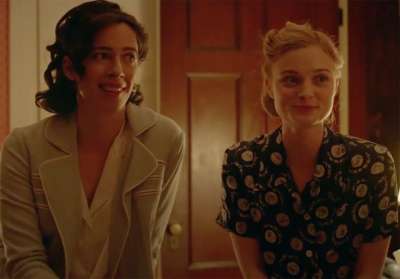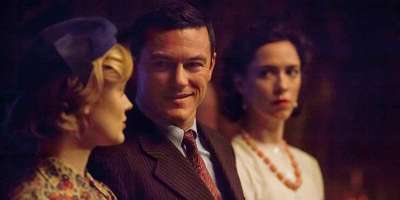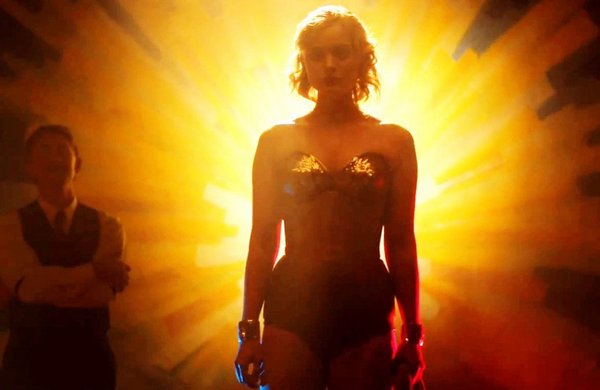“Professor Marston and the Wonder Women” – a film review by Gary Chew
It’s a kinky one, but only superficially. Professor Marston and the Wonder Women loosely falls into a movie niche that contains, as well, a couple of other flicks you could call kinky: Kinsey (2004) and The Hours (2002). Sex sits on the front burner of these three films, some of it gay; and what’s left … as straight.
Such activity gets an up and close look from writer/director Angela Robinson‘s bio-pic on how Wonder Woman, the comic book world’s first female superhero, came to be. Holy Gal Gadot, Bat Guy!
An actual intellectually inclined person known as Dr. William Marston (Luke Evans) came up with the Wonder Woman concept while in, what you’d call, a polyamorous relationship with his wife, Elizabeth (Rebecca Hall) and a female psychology student named Olive Byrne (Bella Heathcote). But shucks, we know how the English language lags in comparison with what French folks speak. “Polyamorous” is really “vanilla” when put along side the titillating term more commonly heard and known as: “ménage à trois.” Like … who today eats their cheeseburger with American fries, I ask!
 Mrs. Marston speaks most of the very blue lines that approach routine on the soundtrack. On the other hand, the film comes off muted. Love scenes establishing “triangularity” eschew specifics so as not to startle too much. That scene looks like it could play in an MGM musical of the 40s. It’s just that the overly enlightened Professor seems to be the most feminist male in WWII society, except for that displayed by Elizabeth and Olive. The chumminess of the trio gets the Prof and Elizabeth dumped from their on campus gig. Olive, after all, is an enrolled student. Wholly unprofessional, Bruce Wayne!
Mrs. Marston speaks most of the very blue lines that approach routine on the soundtrack. On the other hand, the film comes off muted. Love scenes establishing “triangularity” eschew specifics so as not to startle too much. That scene looks like it could play in an MGM musical of the 40s. It’s just that the overly enlightened Professor seems to be the most feminist male in WWII society, except for that displayed by Elizabeth and Olive. The chumminess of the trio gets the Prof and Elizabeth dumped from their on campus gig. Olive, after all, is an enrolled student. Wholly unprofessional, Bruce Wayne!
The Marstons are free thinking. Free love is not an anathema. Olive declares in private moments, while in the Professor’s office, that she agrees and is in love with Elizabeth, whom Ms. Byrne deeply respects as a worthy intellectual. Likely for misogynistic reasons, Elizabeth had been denied a doctorate earlier in her life.
Turns out, each member of the threesome loves both of the others in the ensemble. And it doesn’t disturb the two who are married. Although, given the time in American history, it does piss off lots of others. Conflict ensues, of course … as well as children, born of each female in the party and sired by the professor, alone.
 Along the way, the interaction of the three “inspires” the Professor to make ends meet by writing comic book story lines for other guys who draw those pictures of Wonder Woman employing her kinky-like strategies to make people seek and tell Truth. Sadomasochism, although not blatant, is not something that goes unseen in the panels of Wonder Woman for those old enough to recall. Elizabeth snags a steady job as a paid secretary and stenographer — way below her I.Q pay grade, and Olive handles the offspring. The Marstons, plus Byrne, are happy until neighbors get a notion of the arrangement; and the children, those now in grammar school, are bullied due to the abnormal life style of the Marston family.
Along the way, the interaction of the three “inspires” the Professor to make ends meet by writing comic book story lines for other guys who draw those pictures of Wonder Woman employing her kinky-like strategies to make people seek and tell Truth. Sadomasochism, although not blatant, is not something that goes unseen in the panels of Wonder Woman for those old enough to recall. Elizabeth snags a steady job as a paid secretary and stenographer — way below her I.Q pay grade, and Olive handles the offspring. The Marstons, plus Byrne, are happy until neighbors get a notion of the arrangement; and the children, those now in grammar school, are bullied due to the abnormal life style of the Marston family.
What with all that’s afoot in America regarding contemporary LGBTQ issues, Professor Marston and the Wonder Women ought to stir up progressive thinkers and those who feel the sustained repression of their personal lifestyle that might be so weighted with loving, very much, another human being. Could be that’s why another just released movie called The Battle of the Sexes continues to sell them tickets.
All hail Billie Jean!

- Movie Review: ‘The Glorias’ - September 28, 2020
- Movie Review: ‘I’m Thinking of Ending Things’ - September 10, 2020
- Movie Review: ‘The Burnt Orange Heresy’ - August 31, 2020


